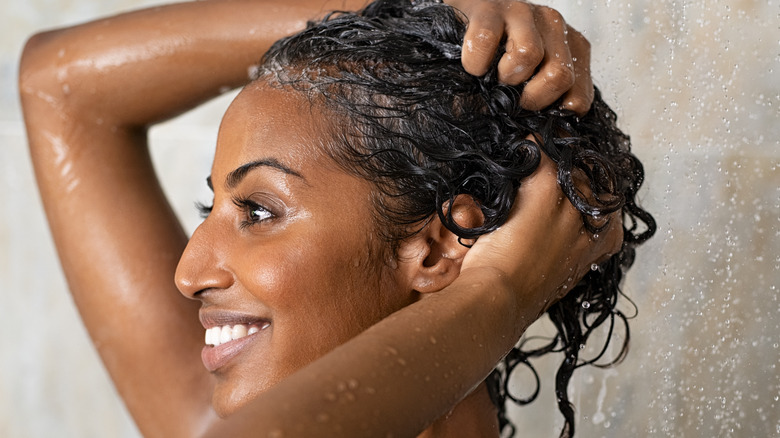Here's The Hair Mask You Should Be Using For Your Specific Hair Type
Using a hair mask might mean spending an extra few minutes on your hair care routine, but regular hair mask use is essential when it comes to caring for your locks. As per Vogue India, hair masks are "potent treatments" that are designed to target specific hair concerns, from dryness and frizziness to damage and a lack of nourishment. When it comes to how often you should use a hair mask, Vogue India noted that your hair type determines how often you should be using hair masks, as well as the best types of masks for your hair.
Celebrity hair expert Jamie Wiley explained to Vogue India that, "Hair masks are unique, because unlike your daily shampoo and conditioner, they can reach further into the hair strand and heal damaged hair. They typically contain rich ingredients with natural oils and antioxidants that are heavier in concentration than conditioners."
Trichologist Lisa Caddy further noted that hair masks are specifically formulated to improve the strength of hair, lock in hydration, and improve hair condition, helping to reduce issues like hair breakage, frizziness, and dryness.
"They can treat surface or mechanical damage that is caused by brushing, teasing, tight ponytails, towel drying, and heat styling," Wiley explained, so if you fall under these hair treatment categories (which most of us do) and you know that there are products that you use on your hair that should really be in the trash, you'll want to keep reading.
How to choose a hair mask for your hair type
As per Vogue India, hair masks are created with a specific hair type — and that hair type's requirements — in mind. Each hair mask is designed to cater to the exact kind of damage or lack of hydration that a certain hair type needs, so it's important to know what product out there is for you.
Shape noted that, when selecting a hair mask, it can be beneficial to understand what causes hair health to degrade in the first place. Every single hair strand has an outer coating called the cuticle — up close this looks like a row of scales — which acts like your hair's bodyguard, protecting it from damage. But, when the cuticle becomes damaged, such as through heat or hair color application, it can leave the cuticle compromised. When this happens, the overall health of the hair is impacted, as moisture is able to escape more easily, which can then result in hair that is dry, frizzy, or damaged.
When it comes to determining the right mask for your hair, celebrity hair expert Jamie Wiley suggested consulting a hairstylist to determine the exact needs of your specific hair type. "They will be able to tell if you have surface damage or chemical damage and which mask will best suit your hair needs," Wiley told Vogue India. "They will also be able to recommend dosage and how often you should use a mask, as you don't want to over do it."
What's the right mask for your hair type and how often should you use it?
There are a lot of hair masks available, all claiming to be the holy grail hair care product, which can make selecting the right mask for your hair type a little tricky.
As per Vogue India, hair that has been colored or chemically treated is usually the most dehydrated and damaged, which means that using a mask that offers intense nourishment is important. Celebrity hair expert Jamie Wiley's favorite hair mask for colored hair is Pureology's Color Fanatic Multi-Tasking Deep Conditioning Mask, which boasts ingredients such as coconut, camelina, and olive oil. She also noted that for hair that has been chemically processed, a hair mask that is protein-rich is the best option.
According to Vogue India, everyone needs to use a hair mask, even if their hair is not colored, chemical-processed, or treated with heat regularly. This is because all hair loses moisture thanks to daily wear and tear, such as from shampoo, hair brushing, and hair band use. Regular hair mask use helps to protect hair from future damage, while also improving appearance.
Vogue India also noted that hair mask usage should depend on the condition of your hair. Wiley explained that, "Depending on the amount of damage to the hair, hair texture and hair density, masks can be used once per month or up to every wash if needed."


